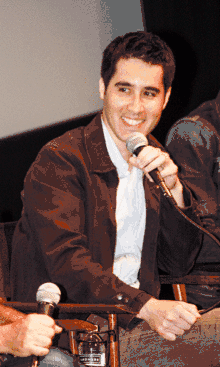David Kwong
David Kwong (born 1980)[1] is a magician, puzzle creator, writer, and producer.[2]
David Kwong | |
|---|---|
 Kwong at "Now You See Me" Q&A, 2013 | |
| Born | August 20, 1980 |
| Alma mater | Harvard University |
| Occupation | Magician, Puzzler, Producer, Public Speaker |
| Years active | 2002 – Present |
Kwong is known for creating illusions and puzzles for film and television and for functioning as a producer and consultant in the field. He produced Deception, ABC's action crime drama about a magician that joins the FBI.[3] Other productions that Kwong has been involved with include Now You See Me (head magic consultant), NBC's Blindspot, The Magnificent Seven, Mission Impossible: Rogue Nation, and The Imitation Game.[1][4][5] Kwong also frequently contributes to the New York Times crossword puzzle along with crossword puzzle editor Will Shortz.[6]
Early life
Kwong is a native of Rochester, New York, where both of his parents are professors at the University of Rochester.[1]
Kwong attended Harvard University, where he studied journalism & media in the history department. He wrote his honors thesis on the history of oriental magicians and their impersonators. He graduated in 2002.[2][7]
Career
Magic
Kwong was inspired to pursue professional magic after attending a talk by conjurer Ricky Jay at Harvard University. After graduation, he moved to Hong Kong for two years, where he performed as a magician at cocktail parties. He later moved back to the United States, working in marketing for HBO in New York and later archiving for Ricky Jay in Los Angeles.[2]
Kwong debuted The Enigmatist at The High Line Hotel in New York City on January 4, 2019.[8] Presented by Greg Berlanti and Robbie Rogers, The Enigmatist is an immersive evening of puzzles, cryptology and illusions.[9] The Enigmatist planned to make its West Coast debut in May 2020 at the Geffen Playhouse.[10]
Public speaking
Kwong has given several TED Talks and regularly speaks on the principles of illusion. His main stage TED Talk on magic and puzzles was coordinated with hiding a secret message in The New York Times crossword puzzle.[11] In 2017, he wrote the book Spellbound: Seven Principles of Illusion to Captivate Audiences and Unlock the Secrets of Success.[12]
Puzzles
Kwong's first crossword puzzle, a joint construction with his friend Kevan Choset, was published in The New York Times on April 1, 2006.[8][2]
Kwong debuted his interactive online puzzle show "Inside the Box", hosted on Zoom, for the Geffen Playhouse in 2020.[13]
References
- "David Kwong helps 'Now You See Me' make magic". Los Angeles Times. May 26, 2013. Retrieved January 6, 2015.
Kwong, 32
- Zhang, Qichen (January 2012). "Five-letter Word for Magic: David Kwong has a trick that's all his own". Harvard Magazine. Retrieved April 6, 2013.
- "Magic Procedural From 'Blindspot' Trio, Futuristic War Drama Land ABC Pilot Pickups". The Hollywood Reporter. Retrieved 2018-02-26.
- "Seen on a Street Corner, Briefly". The New York Times. December 21, 2014.
- "Blindspot boss drops clues on Jane Doe's tattoos" Entertainment Weekly September 11, 2015
- "The Magician and the Crossword". New York Times. December 6, 2010. Retrieved April 6, 2013.
- "David Kwong '02". history.fas.harvard.edu. Retrieved 2021-01-22.
- Amlen, Deb (2018-12-12). "Who Made My Crossword? (Published 2018)". The New York Times. ISSN 0362-4331. Retrieved 2021-01-22.
- Meyer, Dan (2019-01-30). "Immersive Theatre Experience The Enigmatist Extended Through March 2019". Playbill. Retrieved 2019-05-07.
- writer, Los Angeles Times staff. "Geffen Playhouse's 2019-20 season: Nikolaj Coster-Waldau as Macbeth and a world premiere from Qui Nguyen". latimes.com. Retrieved 2019-05-07.
- "Two nerdy obsessions meet – and it's magic". TED.com. July 11, 2014. Retrieved August 3, 2014.
- HarperCollins, ISBN 9780062448460, 0062448463, 272 p.
- Green, Jesse (2020-10-14). "Review: What's 'Inside the Box'? A Rewarding (Rewording) Time". The New York Times. ISSN 0362-4331. Retrieved 2021-01-22.
External links
- David Kwong at TED
